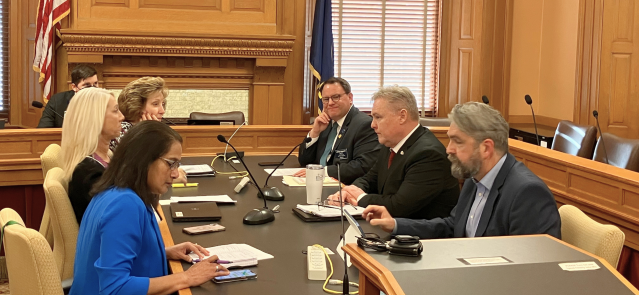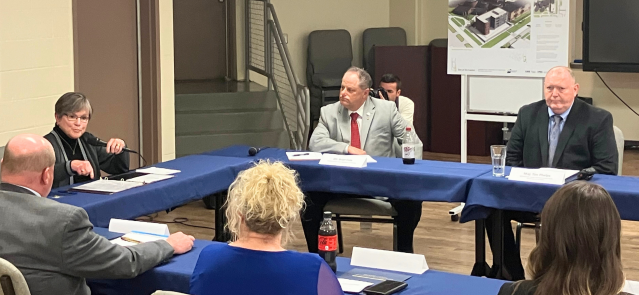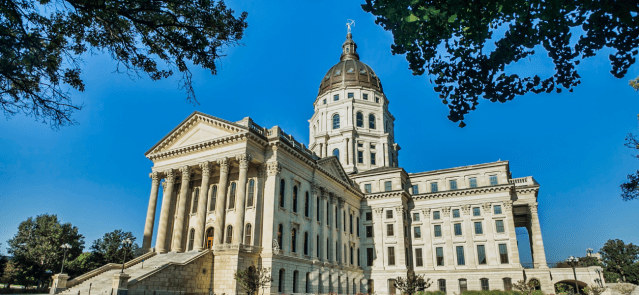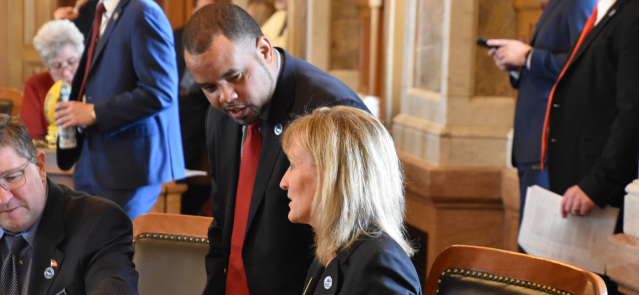Stay ahead of the curve as a political insider with deep policy analysis, daily briefings and policy-shaping tools.
Request a Demo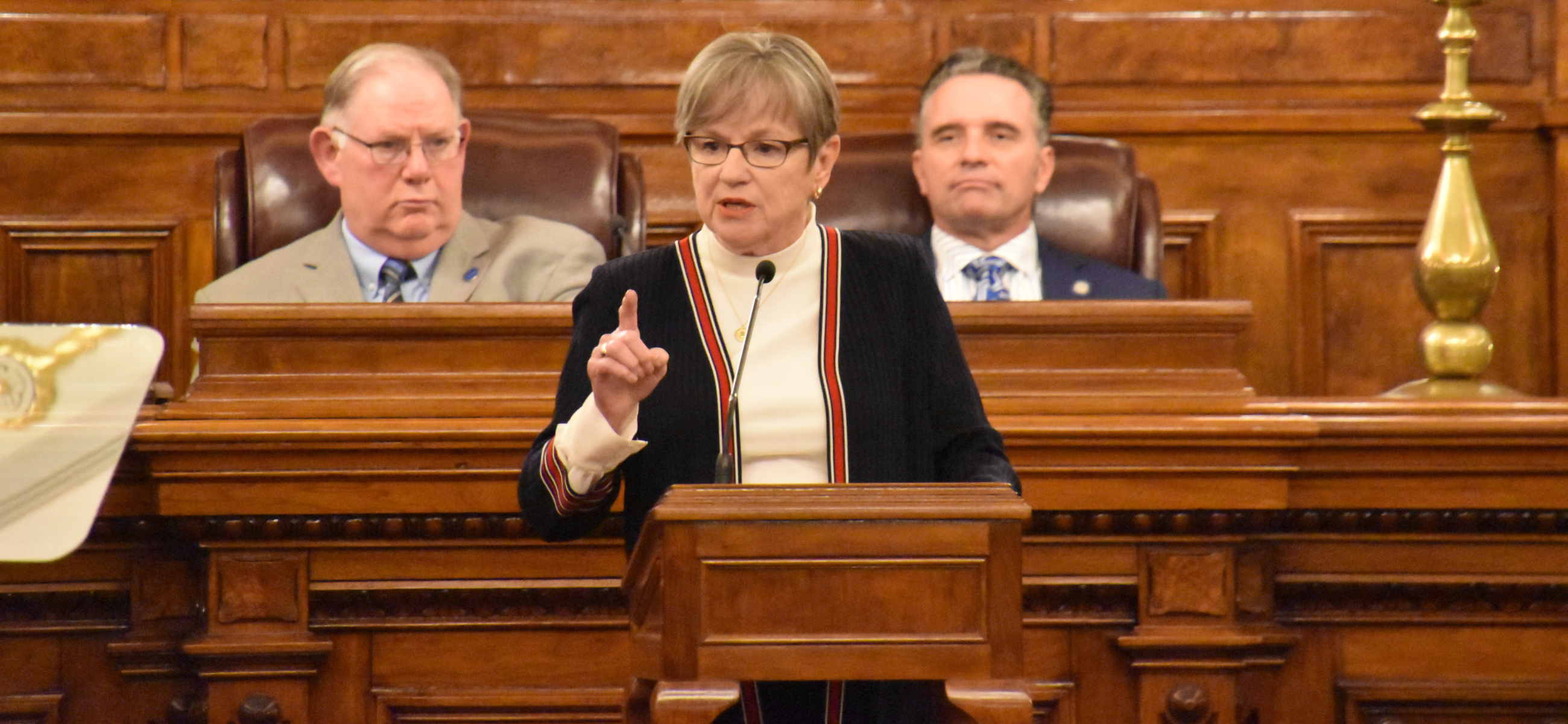
Gov. Laura Kelly delivers her State of the State address Jan. 10 to the Kansas Legislature. (Credit: Bryan Richardson)
Gov. Laura Kelly vetoed the tax cut package Wednesday, setting up an override attempt when the Legislature returns.
Kelly said the bill was unsustainable and that Kansas “must be mindful of the fiscal mistakes of the previous administration” when providing tax relief.
“While I appreciate the bipartisan effort that went into this tax cut package and support many of the provisions included, I cannot sign into law a bill that jeopardizes our state’s future fiscal stability,” Kelly said in her veto message.
Republican leaders quickly vowed to override the veto after lawmakers return Thursday. House Speaker Dan Hawkins, R-Wichita, said that Kelly “isn’t serious” about providing tax relief and that the governor has moved the goal posts on what she finds acceptable.
“We’re going to work to override her veto and get your money back to you,” he said in a statement.
Hawkins pointed to the bill’s bipartisan support in the House, where it passed unanimously, 119-0. House Bill 2036 also passed the Senate 24-9.Senate President Ty Masterson, R-Andover, said Kansans are “rightfully frustrated” by the veto and said the bill is sustainable. He said in a statement he’ll “work to override her veto and encourage our colleagues to ignore the governor’s my-way-or-the-highway stance.”
Kelly’s new plan
Kelly also proposed a new tax plan of her own, one that would leave Kansas’ three-bracket structure in place and would carry a lighter price tag than HB 2036.
Her latest plan would lower the rate for each bracket and increase the standard deduction, the personal exemption and the child care tax credit for dependent care expenses. It would also eliminate state taxes on Social Security income, exempt the first $125,000 of home value from property taxes and accelerate the food sales tax elimination to July 1.
Those new tax rates would slightly drop to 5.65% from 5.7%, 5.2% from 5.25% and 3% from 3.1%. The standard deduction would increase to $5,000 from $3,500, and the personal exemption would rise to $2,400 from $2,250.
In a news release, Kelly said her plan would cost $433 million annually, less than the annual cost of HB 2036. That bill would cost the state $636.7 million in fiscal year 2025, $458.9 million in fiscal year 2026, $462.4 million in fiscal year 2027, $465.7 million in fiscal year 2028 and $468.7 million in fiscal year 2029, according to estimates from the Kansas Department of Revenue.
New revenue estimates released April 19 by the Consensus Revenue Estimating Group projected the state would have a $1.9 billion ending balance in fiscal year 2025 if HB 2036 — and two budget bills — became law.
But in her veto message, Kelly took a more dour tone on the bill’s fiscal impact. She encouraged lawmakers to pass a tax package that doesn’t put the state “on the path to bankruptcy. ”
HB 2036 would eliminate the bottom tax bracket and cut the remaining two brackets to 5.55% and 5.15%. Those cuts would be accompanied by increases to the annual income threshold to $23,000 for single filers and $46,000 for joint filers. The bill also includes provisions addressing property and sales taxes, along with the exemption of Social Security income from state taxes.
Kelly also vetoed a sales tax package, House Bill 2098, which includes a sales tax exemption for veterans with a disability rating of 100% or those deemed totally disabled due to unemployability, among other sales tax exemptions. HB 2098 passed the House 102-17 and the Senate 34-1.
The intent of the bill is “on the right track,” the governor said, but the impact on the state’s coffers “cannot be realized without knowing the total cost of all tax bills, including a fair, sustainable, and fiscally responsible tax relief package. ”
House Dems in a ‘catch-22’
Kelly’s veto of HB 2036 puts House Democrats “in a catch-22,” said House Minority Leader Vic Miller, D-Topeka.
“I like the bill that we sent to the governor,” he said. “We like the bill — it was unanimously supported. … I wish she had not vetoed it.”
Miller said he likes some aspects of Kelly’s proposal better, but there’s no guarantee that sustaining the governor’s veto would lead to her plan passing. He’s worried the veto could be too much tinkering with the specifics of how tax relief is delivered, and the possibility of a new tax bill being less palatable to Democrats “scares” him.
“People out there are getting restless,” Miller said. “They want to see some of that money returned, and I for one want to see that [Kansans] get it. I know [Kelly] does too.”
The House Democratic leader said he wants to back the governor but said he told Kelly’s chief of staff, Will Lawrence, that he wanted an assurance that Republicans would agree to Kelly’s alternative.
“That’s the missing piece,” Miller said. “Maybe she’s talked to them; maybe she’s able to assure us that there’s widespread support for it. If that’s the case, I’m more likely to [sustain the veto]. But short of that, it just really puts us in a tough spot.”
Correction: This story has been updated to correct the eligible disability rating in HB 2098.
Brett Stover is a Statehouse reporter at State Affairs Pro Kansas/Hawver’s Capitol Report. Reach him at [email protected] or on X @BrettStoverKS.
X: @StateAffairsKS
Facebook: @stateaffairsks
LinkedIn: @stateaffairspro
Know the most important news affecting Kansas
Get our free weekly newsletter that covers government, policy and politics that impact your everyday life—in 5 minutes or less.
Unlimited Access: Subscribe for just $2.99/mo billed monthly.
Subscribe NowGet unlimited news access
Already a member? Login here
Ready for a ‘scoop and score’: Legislature takes first step in bid for Chiefs, Royals
The Kansas Legislature hopes a last-minute bill will lure two major Kansas City professional sports teams — the Chiefs and Royals — to the Sunflower State. Jackson County “dropped the ball,” Rep. Sean Tarwater, R-Stilwell, said of the failure of a ballot initiative to pay for renovations at Arrowhead Stadium and a downtown baseball complex. …
Amid final Medicaid Expansion push, Kelly visits Shawnee County jail
Making a final push for Medicaid expansion this session, Gov. Laura Kelly visited the Shawnee County Adult Detention Center on Tuesday. She met with Brian Cole, director of the Shawnee County Department of Corrections, Deputy Director Tim Phelps and others to explore how expansion could benefit local jails. Medicaid expansion “would mean a lot,” Cole …
Government entities converge for inaugural Child Welfare Summit
All three branches of government converged Monday in downtown Topeka for the inaugural Child Welfare Summit. The event, which organizers said drew about 750 people in person and virtually, centered on the framework of Kansas’ foster care system and the myriad challenges faced by those involved with child welfare services. Senate President Ty Masterson, R-Andover, said in opening remarks that the Legislature’s top priority is its handling of “children in need of care.” “Jesus himself said, ‘The poor are always …
Internet age-verification bill makes its way through House
Websites displaying pornography may soon be required to implement age-verification software to block Kansans under 18 from viewing its content. The age-verification requirement for Senate Bill 394, which received preliminary approval on the House floor Monday, is mandatory if one-fourth of the content displayed by a website for a calendar month is considered “harmful to …

